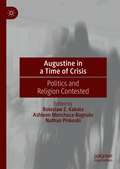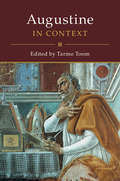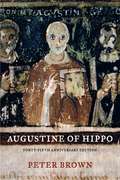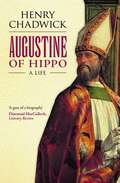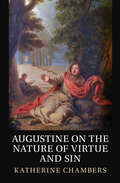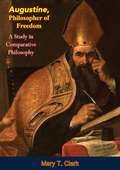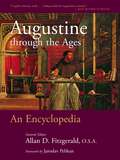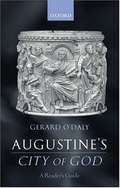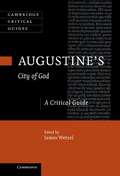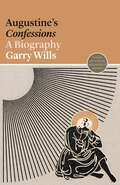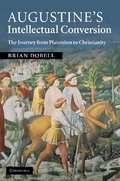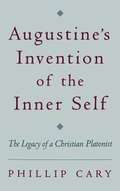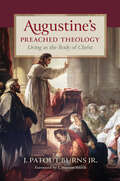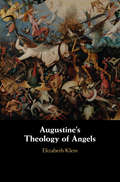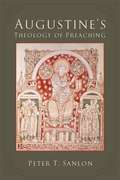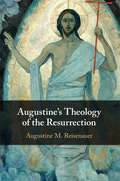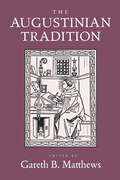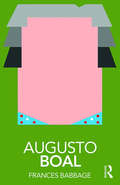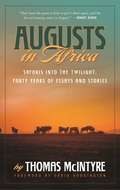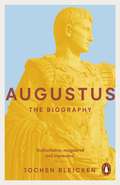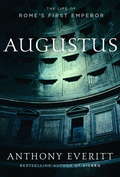- Table View
- List View
Augustine Deformed
by John M. RistAugustine established a moral framework that dominated Western culture for more than a thousand years. His partly flawed presentation of some of its key concepts (love, will and freedom), however, prompted subsequent thinkers to attempt to repair this framework, and their efforts often aggravated the very problems they intended to solve. Over time, dissatisfaction with an imperfect Augustinian theology gave way to increasingly secular and eventually impersonal moral systems. This volume traces the distortion of Augustine's thought from the twelfth century to the present and examines its consequent reconstructions. John M. Rist argues that modern philosophies should be recognized as offering no compelling answers to questions about the human condition and as leading inevitably to conventionalism or nihilism. In order to avoid this end, he proposes a return to an updated Augustinian Christianity. Essential reading for anyone interested in Augustine and his influence, Augustine Deformed revitalizes his original conception of love, will and freedom.
Augustine Heard & Co.: Building a Family Business in the China Trade (B)
by Joycelyn W. Eby William C. KirbyIn 1861, the Heard brothers faced a decision: should they continue their family firm's business model that had made them a successful commission house in China, or was it time to make fundamental adjustments to their work? This case reveals that the brothers decided to maintain the status quo, primarily because of a lack of decision-making mechanism amongst the brothers. The firm rapidly went downhill, before declaring bankruptcy in 1875.
Augustine Heard & Co.: Building a Family Business in the China Trade (A)
by Joycelyn W. Eby William C. Kirby John S. JiAugustine Heard Sr. founded Augustine Heard & Company, a commission house focused on trade between China and the United States, in 1840. He welcomed his four nephews into the family business as it expanded in the increasingly complex economic and political environment of 19th century China. By 1861, the business had been flourishing for many years, but the context for foreign trade in China was changing. The four nephews, all having been made partners in the business, faced a decision. Should (and could) they alter the business model that had served their uncle so well for two decades? How could they best take advantage of the changing environment in China? Most importantly, how could they navigate their relationships as both brothers and partners?
Augustine in a Time of Crisis: Politics and Religion Contested
by Boleslaw Z. Kabala Ashleen Menchaca-Bagnulo Nathan PinkoskiThis volume addresses our global crisis by turning to Augustine, a master at integrating disciplines, philosophies, and human experiences in times of upheaval. It covers themes of selfhood, church and state, education, liberalism, realism, and 20th-century thinkers. The contributors enhance our understanding of Augustine’s thought by heightening awareness of his relevance to diverse political, ethical, and sociological questions. Bringing together Augustine and Gallicanism, civil religion, and Martin Luther King, Jr., this volume expands the boundaries of Augustine scholarship through a consideration of subjects at the heart of contemporary political theory.
Augustine in Context
by Tarmo ToomAugustine in Context assesses the various contexts - historical, literary, cultural, spiritual - in whichAugustine lived and worked. The essays, written by an international team of scholars especially for this volume, provide the background against which Augustine's treatises should be read and interpreted. They are organized according to a rationale which moves from an introduction to the person (the so-called 'personal context') to the contexts of Augustine's works and ideas, starting from the intellectual setting and extending to the socio-political realm. Collectively the essays highlight the embeddedness of Augustine in the world of late antiquity and the interdependence of his discourse with contemporary forms of social life. They shed new light on one of the most important figures of the western canon and facilitate a more enlightened reading of his writings.
Augustine of Hippo: A Biography
by Peter BrownThis classic biography was first published thirty years ago and has since established itself as the standard account of Saint Augustine's life and teaching. The remarkable discovery recently of a considerable number of letters and sermons by Augustine has thrown fresh light on the first and last decades of his experience as a bishop. These circumstantial texts have led Peter Brown to reconsider some of his judgments on Augustine, both as the author of the Confessions and as the elderly bishop preaching and writing in the last years of Roman rule in north Africa. Brown's reflections on the significance of these exciting new documents are contained in two chapters of a substantial Epilogue to his biography (the text of which is unaltered). He also reviews the changes in scholarship about Augustine since the 1960s. A personal as well as a scholarly fascination infuse the book-length epilogue and notes that Brown has added to his acclaimed portrait of the bishop of Hippo.
Augustine Of Hippo: A Life
by Henry ChadwickAugustine (354-430) had a profound impact on the development of the Christian Church, sparking controversy and influencing the ideas of theologians for over fifteen centuries. His words are still frequently quoted in devotions today and his key themes retain a striking contemporary relevance--what is the place of the Church in the world? What is the relation between nature and grace? In Augustine of Hippo, the late Henry Chadwick--a renowned authority on Augustine--describes with clarity and warmth the intellectual development of this key Father of the Church. In his characteristically rigorous yet sympathetic style, Chadwick traces Augustine's intellectual journey from schoolboy and student to Bishop and champion of Christendom in a period of intense political upheaval, providing valuable insight into the progression of Augustine's ideas. With a foreword reflecting on Chadwick's distinctive approach to Augustine by Peter Brown, and a further reading list on Augustine compiled by Gillian Clark, this volume is both an essential assessment of Augustine and a final tribute to one of the great church historians of the twentieth century.
Augustine, Philosopher of Freedom: A Study in Comparative Philosophy
by Mary ClarkThe riches of our Christian tradition need to be mined anew for each generation. Accordingly, Mother Clark’s book is destined to make the treasures of Augustine’s thought accessible to the student and to the average reader. Contributing to a clearer, more complete understanding of Augustine, Mother Clark considers her subject in the light of a single, basic principal: the idea of freedom. Augustine himself is allowed in this book to speak out on a topic so appropriate to the world today. Freedom, exploited by Existentialists, denied by Totalitarians, was appreciated properly by St. Augustine. Here is a book calculated to put in bold relief the timelessness of Augustine’s genius and to explain to modern man the truths he needs most: the meaning of God and the meaning of man.
Augustine through the Ages: An Encyclopedia
by Allan D. FitzgeraldThe definitive reference work on Augustine that scholars, from all fields of theological study, describe as "superb" and "indispensable" for students, scholars, libraries, and anyone interested in studying Augustine. While the work provides exhaustive resources on Augustine's own life and his theological and pastoral work, it also provides an exceptional wealth of information about scholarship, past and present on the great theologian. Moreover, it documents the influence of Augustine on the Catholic Church, the Reformation and on great thinkers and theologians such as Kierkegaard, Luther, Erasmus, and Calvin. Topics range from archeology to martyrdom, from imagination to Augustine's personal friends.
Augustine's City Of God: A Reader's Guide
by Gerard J. P. O'Daly Gerard O'DalyThe City of God is the most influential of Augustine's works, which played a decisive role in the formation of the Christian West. This book is the first comprehensive modern guide to it in any language.The City of God's scope embodies cosmology, psychology, political thought, anti-pagan polemic, Christian apologetic, theory of history, biblical interpretation, and apocalyptic themes. This book is, therefore, at once about a single masterpiece and at the same time surveys Augustine's developingviews through the whole range of his thought. The book is written in the form of a detailed running commentary on each part of the work. Further chapters elucidate the early fifth-century political, social, historical, and literary background, the work's sources, and its place in Augustine'swritings.The book should prove of value to Augustine's wide readership among students of late antiquity, theologians, philosophers, medievalists, Renaissance scholars, and historians of art and iconography.
Augustine's City of God
by James WetzelAugustine's City of God has profoundly influenced the course of Western political philosophy, but there are few guides to its labyrinthine argumentation that hold together the delicate interplay of religion and philosophy in Augustine's thought. The essays in this volume offer a rich examination of those themes, using the central, contested distinction between a heavenly city on earthly pilgrimage and an earthly city bound for perdition to elaborate aspects of Augustine's political and moral vision. Topics discussed include Augustine's notion of the secular, his critique of pagan virtue, his departure from classical eudaimonism, his mythology of sin, his dystopian politics, his surprising attention to female bodies, his moral psychology, his valorisation of love, his critique of empire and his conception of a Christian philosophy. Together the essays advance our understanding of Augustine's most influential work and provide a rich overview of Augustinian political theology and its philosophical implications.
Augustine's Confessions: A Biography (Lives of Great Religious Books #3)
by Garry WillsFrom Pulitzer Prize–winner Garry Wills, the story of Augustine’s ConfessionsIn this brief and incisive book, Pulitzer Prize-winning historian Garry Wills tells the story of the Confessions--what motivated Augustine to dictate it, how it asks to be read, and the many ways it has been misread in the one-and-a-half millennia since it was composed. Following Wills's biography of Augustine and his translation of the Confessions, this is an unparalleled introduction to one of the most important books in the Christian and Western traditions.Understandably fascinated by the story of Augustine's life, modern readers have largely succumbed to the temptation to read the Confessions as autobiography. But, Wills argues, this is a mistake. The book is not autobiography but rather a long prayer, suffused with the language of Scripture and addressed to God, not man. Augustine tells the story of his life not for its own significance but in order to discern how, as a drama of sin and salvation leading to God, it fits into sacred history. "We have to read Augustine as we do Dante," Wills writes, "alert to rich layer upon layer of Scriptural and theological symbolism." Wills also addresses the long afterlife of the book, from controversy in its own time and relative neglect during the Middle Ages to a renewed prominence beginning in the fourteenth century and persisting to today, when the Confessions has become an object of interest not just for Christians but also historians, philosophers, psychiatrists, and literary critics.With unmatched clarity and skill, Wills strips away the centuries of misunderstanding that have accumulated around Augustine's spiritual classic.
Augustine's Inner Dialogue: The Philosophical Soliloquy in Late Antiquity
by Brian StockAugustine's philosophy of life involves mediation, reviewing one's past and exercises for self-improvement. Centuries after Plato and before Freud he invented a 'spiritual exercise' in which every man and woman is able, through memory, to reconstruct and reinterpret life's aims. Brian Stock examines Augustine's unique way of blending literary and philosophical themes. He proposes a new interpretation of Augustine's early writings, establishing how the philosophical soliloquy (soliloquium) has emerged as a mode of inquiry and how it relates to problems of self-existence and self-history. The book also provides clear analysis of inner dialogue and discourse and how, as inner dialogue complements and finally replaces outer dialogue, a style of thinking emerges, arising from ancient sources and a religious attitude indebted to Judeo-Christian tradition.
Augustine's Intellectual Conversion: The Journey from Platonism to Christianity
by Brian DobellThis book examines Augustine's intellectual conversion from Platonism to Christianity, as described at Confessions 7, 9, 13-21, 27. It is widely assumed that this occurred in the summer of 386, shortly before Augustine's volitional conversion in the garden at Milan. Brian Dobell argues, however, that Augustine's intellectual conversion did not occur until the mid 390s, and develops this claim by comparing Confessions 7, 9, 13-21, 27 with a number of important passages and themes from Augustine's early writings. He thus invites the reader to consider anew the problem of Augustine's conversion in 386: was it to Platonism or Christianity? His original and important study will be of interest to a wide range of readers in the history of philosophy and the history of theology.
Augustine's Invention of the Inner Self: The Legacy of a Christian Platonist
by Phillip CaryPhillip Cary argues that Augustine invented the concept of the self as a private inner space--a space into which one can enter and in which one can find God. Although it has often been suggested that Augustine in some way inaugurated the Western tradition of inwardness, this is the first study to pinpoint what was new about Augustine's philosophy of inwardness and situate it within a narrative of his intellectual development and his relationship to the Platonist tradition. Augustine invents the inner self, Cary argues, in order to solve a particular conceptual problem. Augustine is attracted to the Neoplatonist inward turn, which located God within the soul, yet remains loyal to the orthodox Catholic teaching that the soul is not divine. He combines the two emphases by urging us to turn "in then up"--to enter the inner world of the self before gazing at the divine Light above the human mind. Cary situates Augustine's idea of the self historically in both the Platonist and the Christian traditions. The concept of private inner self, he shows, is a development within the history of the Platonist concept of intelligibility or intellectual vision, which establishes a kind of kinship between the human intellect and the divine things it sees. Though not the only Platonist in the Christian tradition, Augustine stands out for his devotion to this concept of intelligibility and his willingness to apply it even to God. This leads him to downplay the doctrine that God is incomprehensible, as he is convinced that it is natural for the mind's eye, when cleansed of sin, to see and understand God. In describing Augustine's invention of the inner self, Cary's fascinating book sheds new light on Augustine's life and thought, and shows how Augustine's position developed into the more orthodox Augustine we know from his later writings.
Augustine's Preached Theology: Living as the Body of Christ
by J. Patout Burns Jr.Vital insights from Augustine&’s sermons on the life of faith. Augustine is not usually thought of today as a preacher, but he delivered sermons weekly over the course of nearly forty years to his congregation in Hippo Regius and occasionally also in Carthage and other Roman cities he visited as bishop. The differences between his sermons and his theological treatises are striking but not surprising considering that the treatises targeted an elite, educated audience while his preaching was intended for Christians who lived—then as now—by the spoken and remembered rather than the written word. Where Augustine&’s treatises were intellectual, intricate, and theoretical, the rhetoric of his sermons is characterized by conviction, emotion, and a firm commitment to putting faith into action. This volume by renowned Augustine scholar Patout Burns explores the theology of Augustine&’s preaching. Utilizing recent advances in the chronological ordering of Augustine&’s extant sermons, Burns traces the development of their core thematic elements—wealth and poverty, sin and forgiveness, baptism, eucharist, marriage, the role of clergy, the interpretation of Scripture, the human condition, and the saving work of Christ. He also identifies the influence and manifestation of significant controversies in Augustine&’s preaching, most notably Donatism and Pelagianism. As Burns shows, most of Augustine&’s groundbreaking insights on the relation of Christ to Christians were developed in his sermons. Like any good preacher, Augustine strove to establish a dialogue between scripture and lived experience through his sermons—and did so quite effectively. Thus, pastors as well as scholars will benefit from Burns&’s insight into the teachings of one of the most effective ministers in Christian history.
Augustine’s Theology of Angels
by Elizabeth Klein<P>References to the good angels in the works of Augustine are legion, and angels also play a central role in some of his major works, such as City of God and the opening of On the Trinity. Despite Augustine's interest in angels, however, little scholarly work has appeared on the topic. <P>In this book, Elizabeth Klein gives the first comprehensive account of Augustine's theology of the angels and its importance for his thought more generally. Offering a close textual analysis of the reference to angels in Augustine's corpus, the volume explores Augustine's angelology in relationship with his understanding of creation, of community, of salvation history and of spiritual warfare. <P>By examining Augustine's angelology, we glimpse his understanding of time and eternity, as well as the meaning and perfection of created life. Klein's book is foundational for a proper understanding of Augustine's angelology and has far-reaching implications not only for Augustinian studies, but also the broader history of Christian angelology.
Augustine's Theology of Preaching
by Peter T. Sanlon<p>Scholarship has painted many pictures of Augustine—the philosophical theologian, the refuter of heresy, or contributor to doctrines like Original Sin—but the picture of Augustine as preacher, says Sanlon, has been seriously neglected. When academics marginalize the Sermones ad Populum, the real Augustine is not presented accurately. In this study, Sanlon does more, however, than rehabilitate a neglected view of Augustine. <p>How do the theological convictions that Augustine brought to his preaching challenge, sustain, or shape our work today? By presenting Augustine's thought on preaching to contemporary readers Sanlon contributes a major new piece to the ongoing reconsideration of preaching in the modern day, a consideration that is relevant to all branches of the twenty-first century church. </p>
The Augustinian Tradition (Philosophical Traditions #8)
by Gareth B. MatthewsAugustine, probably the single thinker who did the most to Christianize the classical learning of ancient Greece and Rome, exerted a remarkable influence on medieval and modern thought, and he speaks forcefully and directly to twentieth-century readers as well. The most widely read of his writings today are, no doubt, his Confessions—the first significant autobiography in world literature—and The City of God. The preoccupations of those two works, like those of Augustine's less well-known writings, include self-examination, human motivation, dreams, skepticism, language, time, war, and history—topics that still fascinate and perplex us 1,600 years later.The Augustinian Tradition, like a number of recent single-authored books, expresses a new interest among contemporary philosophers in interpreting Augustine freshly for readers today. These articles, most of them written expressly for the book, present Augustine's ideas in a way that respects their historical context and the long history of their influence. Yet the authors, among whom are some of the best philosophers writing in English today, make clear the relevance of Augustine's ideas to present-day debates in philosophy, literary studies, and the history of ideas and religion. Students and scholars will find that these essays provide impressive evidence of the persisting vitality of Augustine's thought.
Augusto Boal (Routledge Performance Practitioners)
by Frances BabbageThis newly-updated volume looks at the scope of Augusto Boal's career from his early work as a playwright and director in Sao Paulo in the 1950s, to the development of his ground-breaking manifesto in the 1970s for a 'Theatre of the Oppressed'. Offering fascinating reading for anyone interested in the role that theatre can play in stimulating social and personal change, this useful study includes: a biographical and historical overview of Boal's career as theatre practitioner and director an in-depth analysis of Boal's classic text on radical theatre an exploration of training and production techniques practical guidance to Boal's workshop methods This is an essential introduction to the work of a practitioner who has had a tremendous impact on contemporary theatre. As a first step towards critical understanding, and as an initial exploration before going on to further, primary research, Routledge Performance Practitioners are unbeatable value for today’s student.
Augusts in Africa: Safaris into the Twilight: Forty Years of Essays and Stories
by Thomas Mcintyre Craig Boddington Andrew Warrington"They burn the grass in July to get it short again, and the decent hunting starts in August." -Robert RuarkAmericans from Roosevelt to Hemingway to Ruark to Capstick to Robert Jones defined Africa in ways that no European colonist ever would or could. In Augusts in Africa, Thomas McIntyre presents the stories he has gathered from four decades of safari-ing in Africa-and from among the most transforming days, weeks, and months of his life.For those who know it well, these tales may read like accurate reflections of their own experiences on the continent. For others who have journeyed to Africa only briefly, or even not at all, there is a transporting insight to be found in them. And if there is more than one account on the hunting of the Cape buffalo, that is only because it, the buffalo, may simply represent the ideal combination (the "perfect game") of size, strength, intelligence, and vehemence to be found in any large wild animal and is therefore indicative of what draws us back again and again to Africa.Whether crouched in a blind for hours until he can clearly make out the individual rosettes on a leopard's hide or listening to the professional hunter utter "Oh oh, you should run" when faced with a charging elephant cow, Tom McIntyre brings to life amazing African animals and exciting expeditions in Augusts in Africa.
Augustus: The Biography
by Jochen BleickenThe great modern biography of Augustus, founder of the Roman EmpireBorn to a plebeian family in 63 BC, Octavian was a young solder training abroad when he heard news of Julius Caesar's brutal assassination - and discovered that he was the dictator's sole political heir. With the opportunism and instinct for propaganda that were to characterize his rule, Octavian rallied huge financial, military and political backing to eliminate his opponents, end the bloody turmoil that had so long wracked Rome and, finally, take autocratic control of a state devoted to republicanism. He became Augustus - Rome's first Emperor, and the founder of the greatest empire the world had ever seen.In this monumental biography, translated into English for the first time by Anthea Bell, Jochen Bleicken tells the story of a man who found himself a demi-god in his own lifetime and paints a portrait of one of the most dramatic periods of Roman history.
Augustus: The Life of Rome's First Emperor
by Anthony EverittHe found Rome made of clay and left it made of marble. As Rome's first emperor, Augustus transformed the unruly Republic into the greatest empire the world had ever seen. His consolidation and expansion of Roman power two thousand years ago laid the foundations, for all of Western history to follow. Yet, despite Augustus's accomplishments, very few biographers have concentrated on the man himself, instead choosing to chronicle the age in which he lived. Here, Anthony Everitt, the bestselling author of Cicero, gives a spellbinding and intimate account of his illustrious subject. Augustus began his career as an inexperienced teenager plucked from his studies to take center stage in the drama of Roman politics, assisted by two school friends, Agrippa and Maecenas. Augustus's rise to power began with the assassination of his great-uncle and adoptive father, Julius Caesar, and culminated in the titanic duel with Mark Antony and Cleopatra.The world that made Augustus-and that he himself later remade-was driven by intrigue, sex, ceremony, violence, scandal, and naked ambition. Everitt has taken some of the household names of history-Caesar, Brutus, Cassius, Antony, Cleopatra-whom few know the full truth about, and turned them into flesh-and-blood human beings.At a time when many consider America an empire, this stunning portrait of the greatest emperor who ever lived makes for enlightening and engrossing reading. Everitt brings to life the world of a giant, rendered faithfully and sympathetically in human scale. A study of power and political genius, Augustus is a vivid, compelling biography of one of the most important rulers in history.From the Hardcover edition.

